7 Mins Read
As awareness about the environmental and welfare detriments of the textile industry grows, a new crop of startups is developing novel alternatives to change the way we dress and live.
If things continue the way they are, the fashion industry will use up a quarter of the world’s carbon budget by 2050.
This is because the traditional materials used by textile manufacturers are terrible for the environment. Cotton is too water-intensive, leather is carbon-heavy, as are plastics, which don’t break down for centuries and are toxic to human health.
Disrupting these categories isn’t a new idea. Look at leather, for example. Synthetic leather has been around since the 19th century when it proved a viable, cost-effective alternative to the real thing. Today, this is a $40B sector that looks to take animal abuse out of the equation, but it’s an industry built on plastic.
Plastic, a group of synthetic polymers made from fossil fuels (coal, crude oil or natural gas), emits more greenhouse gases than the aviation sector, and a third of all plastic waste ends up in soil or freshwater, disintegrating into microplastics that enter the food chain. In fact, these tiny particles have already been discovered in the human body, and one study estimates that we eat 5g of microplastics per week on average (about the same as eating a credit card’s worth of plastic).
Then there’s the waste aspect: every second, the equivalent of one dumper truck of textiles is either landfilled or incinerated around the world. To make matters worse, textile waste has been estimated to increase by about 60% between 2015 and 2030, not to mention the thorny issue of waste colonialism, whereby wealthier nations ship their fashion and clothing waste to developing countries where they create toxic mounds of garbage.
The fashion industry is desperately in need of future-proof solutions that are climate-friendly, low to no waste, land-light and That leaves the textile industry in a spot of bother, and in dire need of future-friendly solutions. Fortunately, a host of new startups are doing just that, coming up with more sustainable alternatives that don’t harm the environment and offer the same functionality we expect from conventional fabrics and materials.
Newlight Technologies
Headquarters: Huntington Beach, California, US
Founders: Mark Herrema and Kenton Kimmel
Total funding: $231.6M
Founded in 2003, Newlight Technologies is solving several problems at once. It makes its AirCarbon bioplastic through fermentation, feeding marine microorganisms on carbon dioxide as well as methane from dairy farms to produce a material that can melt the same way plastic can. It’s working towards a circular process that uses anaerobic digestors to turn AirCarbon into biogas, which can in turn produce AirCarbon and power. The firm has previously rolled out cutlery, handbags, wallets and sunglasses under its brands, and has collaborated with Nike.
It’s not just textiles – Newlight Technologies recently showcased its AirCarbon straws in a sustainable cocktail at the Anaheim Marriott.
Natural Fiber Welding
Headquarters: Peoria, Illinois, US
Founders: Luke Haverhals
Total funding: $136.5M

Natural Fiber Welding makes plastic-free biomaterials, including leathers, footwear outsoles, foam, and fabrics. The latter range is called Clarus, made using virgin and recycled natural fibres. The technology behind these textiles strengthens natural yarns, using closed-loop chemistry to create knits, wind-resistant wovens, and durable cotton canvas with high-value performance features. Its technology is licenced to five international manufacturers, and it has plans to expand to 22 other countries across the globe.
An Earthshot Prize 2024 finalist, the company works with 40 brands, including Stella McCartney, Patagonia, BMW, and Ralph Lauren – the latter debuted its RLX Clarus polo shirt at the 2022 Australian Tennis Open.
Galy
Headquarters: Boston, Massachusetts, US
Founders: Luciano Bueno and Paula Elbl
Total funding: $65M
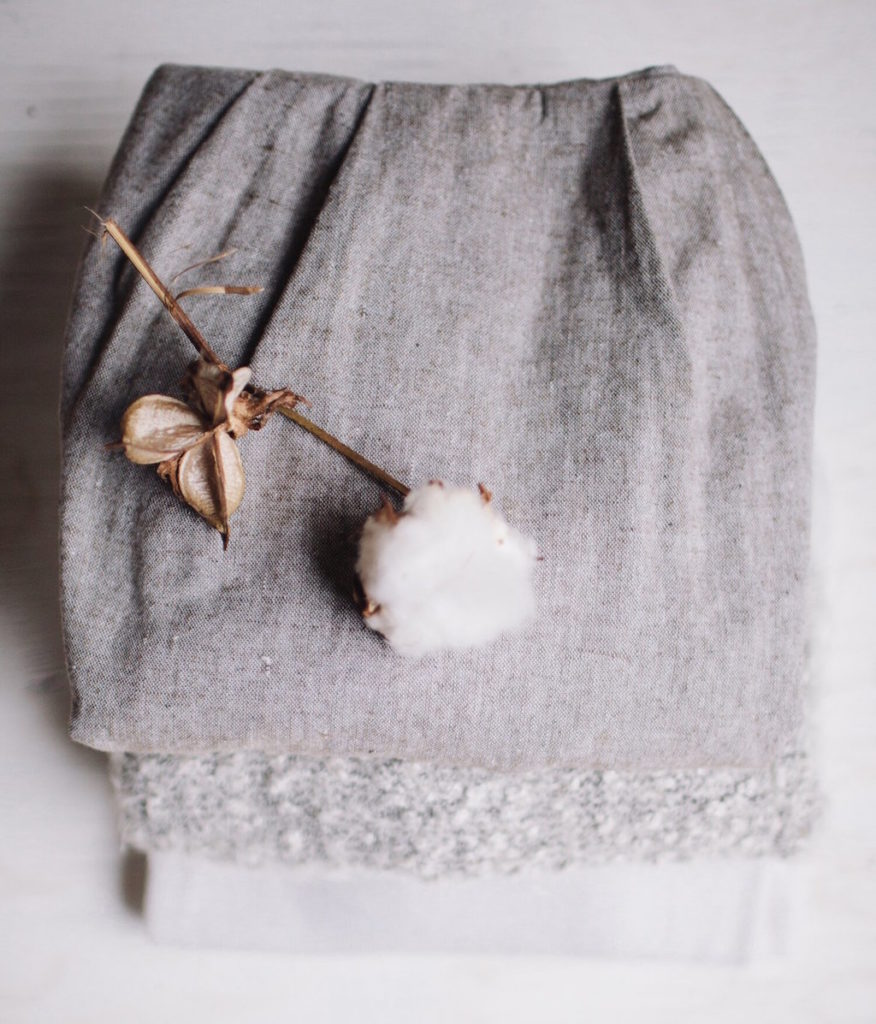
Backed by the likes of H&M, Inditex, Bill Gates and Sam Altman, Galy is sidestepping the farmed cotton industry altogether, instead using cellular agriculture to grow an alternative in labs. In a process that requires 99% less water and 97% less land, it feeds cotton cells on sugars in bioreactors, selectively regulating genes once the cells multiply to the required volumes, and transforming them into cotton fibre. It has secured millions of dollars in proof-of-concept agreements with industry leaders for its lab-grown cotton and is now scaling up towards a pre-industrial scale.
Galy’s Literally Cotton was recognised on Time’s 200 Best Inventions list for 2024. “With all due respect to agriculture, we believe we can produce the same thing in a lab facility, better,” co-founder and CEO Luciano Bueno told the magazine.
Evrnu
Headquarters: Mercer Island, Washington, US
Founders: Stacey Flynn and Christo Stanev
Total funding: $31M

Until April, Evrnu was a textile recycling company. But earlier this year, it made its D2C play with a fashion brand called Nucycle. The firm collects and shreds cotton textile waste, processes it into liquid pulp, extrudes that into lyocell fibre, which is knitted into fabrics and garments. The material is said to be inherently soft, absorbent, and stronger than virgin cotton and polyester. Evrnu launched its first product in March, a fully recyclable 360 Hoodie made from Nucycle.
The startup is part of the World Economic Forum’s Technology Pioneer community. And the tech has impressed many industry giants, with Evrnu inking deals with Adidas, Levi’s, Stella McCartney, Target, Pangaia and Zara, among others.
Circulose
Headquarters: Sundsvall, Sweden
Founders/parent company: Christofer Lindgren, Gunnar Henriksson, Johan Sundblad, Malcolm Norlin and Mikael Lindström (now owned by Altor)
Total funding: $10.6M
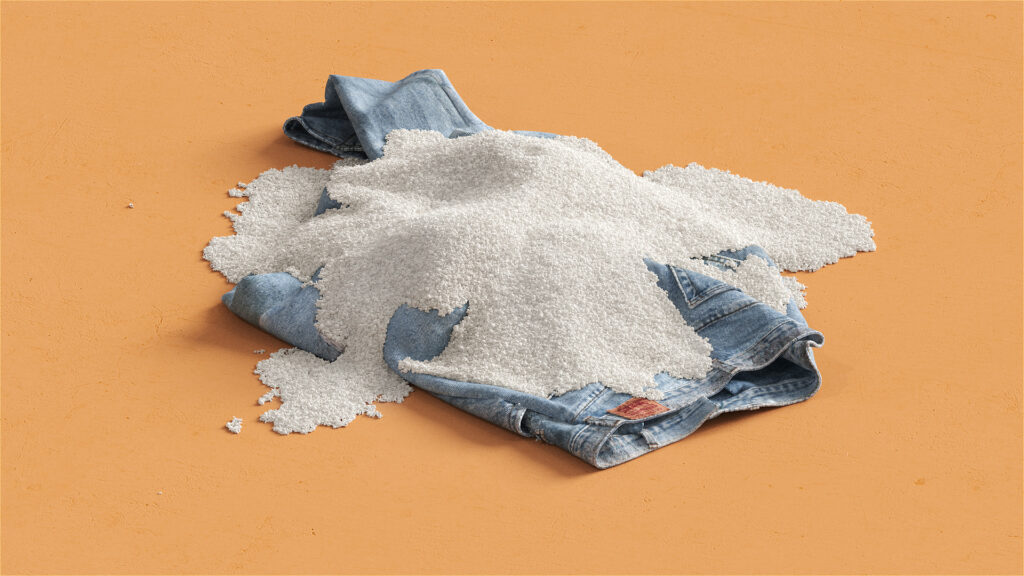
Another recycled cotton waste innovator, Circulose (formerly Renewcell) recovers cellulose from worn-out clothes and production scraps to make a “dissolving pulp” that can form the base of viscose, lyocell, modal, acetate, and other regenerated fibres. These can be spun into yarns, woven or knitted into fabrics, and cut and sewn into virgin-quality textile products, replacing materials like cotton and wood pulp. The company works with brands like Calvin Klein, & Other Stories, and more.
Circulose’s pulp was part of Knits, Denim and other fashion items in Ganni’s Spring/Summer 2025 collection at Paris Fashion Week.
TômTex
Headquarters: Brooklyn, New York, US
Founders: Uyen Tran & Ross McBee
Total funding: $4.15M
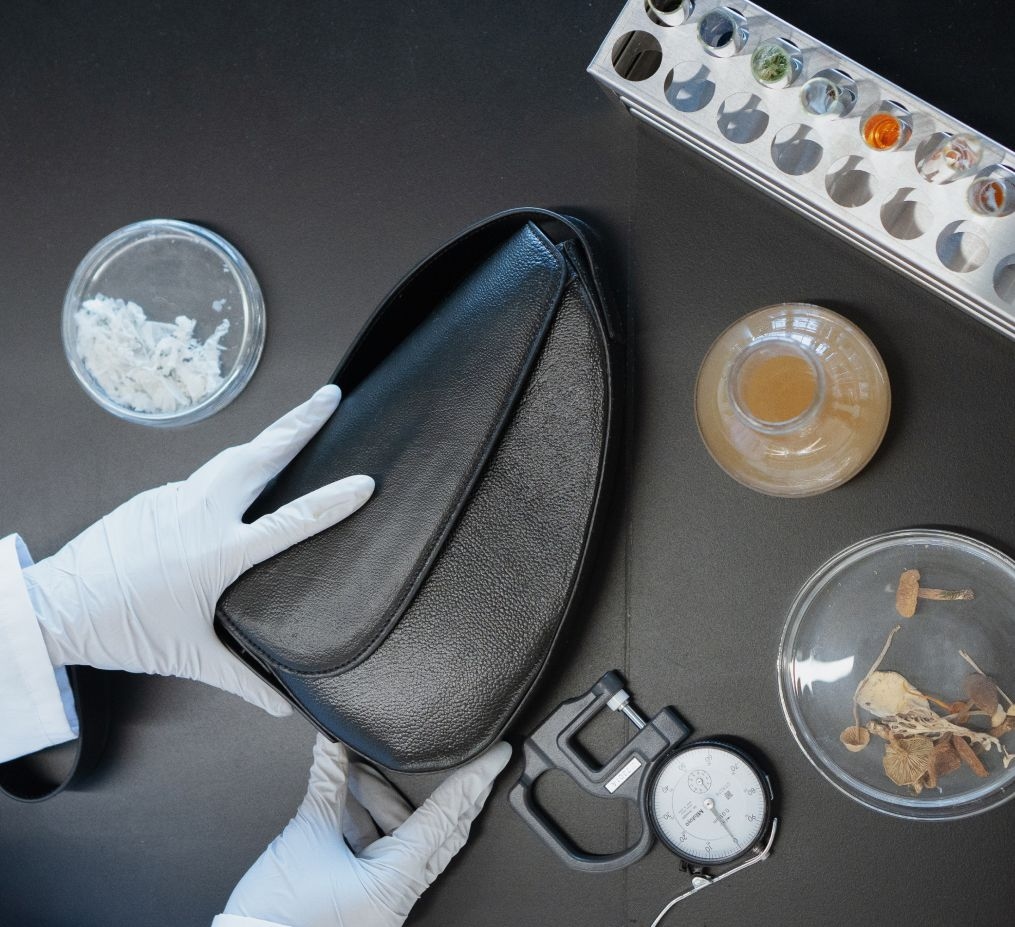
TômTex is a flexible biomaterial made from chitosan, a biopolymer found in the exoskeletons of shellfish and crustaceans, coffee, and mushrooms. The startup sources the chitosan from waste seafood shells and mushrooms, which is processed into a biodegradable leather alternative that’s soft enough to be both hand-stitched or machine-sewn.
The startup’s material was also named one of Time’s 200 Best Inventions of 2024, and co-founder Ross McBee told the magazine that it will be available next year for $2.50-3.50 per sq ft, on par with mid-tier conventional leather.
BioFluff
Headquarters: Paris, France
Founders: Martin Steubler, Steven Usdan and Roni Gamzon
Total funding: $3M
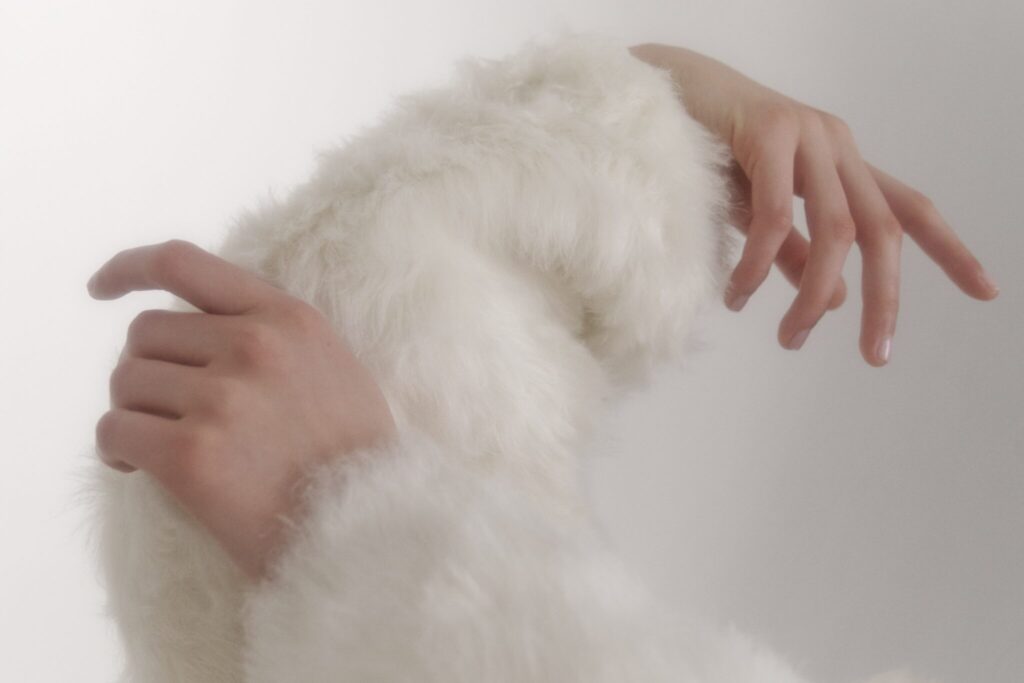
BioFluff is targeting the luxury end of the market with plant-based alternatives to animal- and plastic-derived fur, shearling and plush, which it aims to bring to market under its Savian brand. It uses 100% renewable plant fibres and agricultural waste to transform nettle, hemp and flex into these fully biodegradable alt-materials, reducing emissions by 40-90%.
The company recently unveiled the world’s first teddy bear made from vegan fur, while introducing a one-off pink handbag with Ganni.
Alt Tex
Headquarters: Toronto, Canada
Founders: Myra Arshad and Avneet Ghotra
Total funding: $2.3M
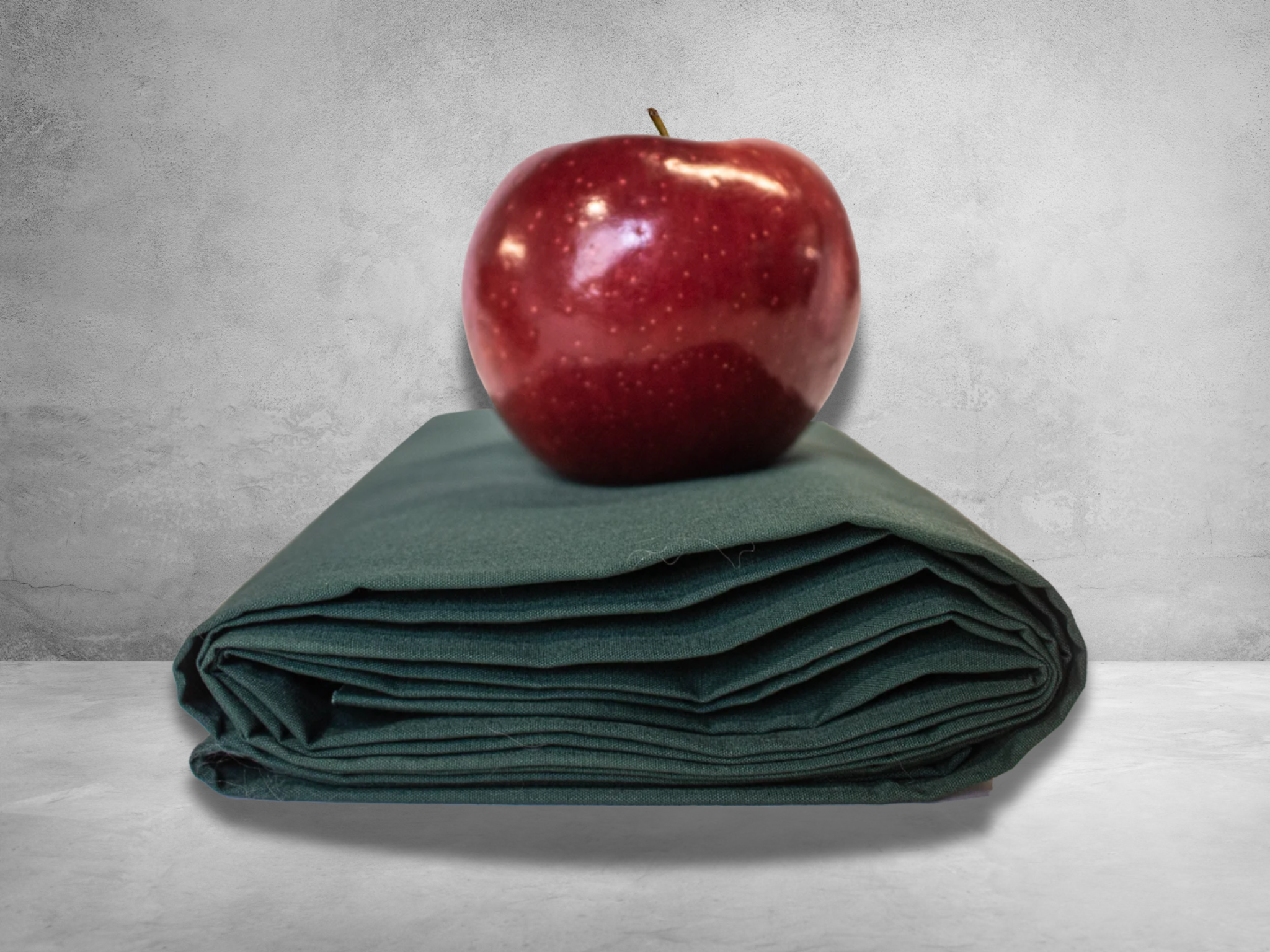
Canadian startup Alt Tex is making a food-waste-based alternative to polyester, the plastic textile present in 60% of all clothing. It uses microbial fermentation to turn food waste, another large landfill contributor, into biodegradable polymers, which are mixed with additives to create fibres to sell to fashion brands. A single shirt made from the fabric can divert 1kg of food waste from landfills and 9kg of carbon from the atmosphere. Alt Tex’s first fabric prototype is said to be 70% stronger than cotton.
Its founders Myra Arshad and Avneet Ghotra were named on Forbes’s 30 Under 30 North America list for 2025 in the manufacturing and industry category.
Ponda
Headquarters: Bristol, UK
Founders: Julian Ellis-Brown, Neloufar Taheri, Antonia Jara and Finlay Duncan
Total funding: Undisclosed
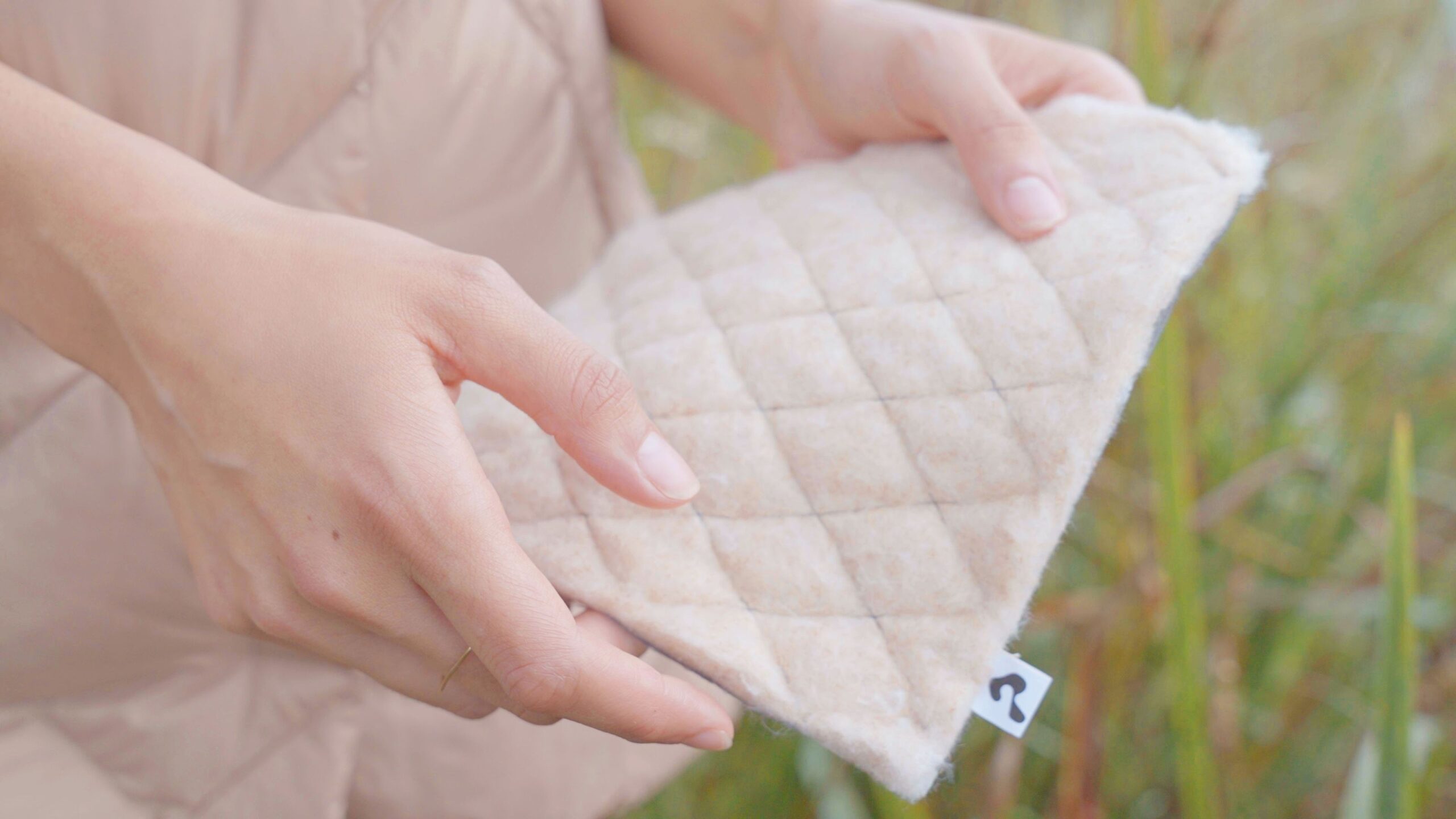
Formerly known as SaltyCo, Ponda develops novel textiles from regenerative fibres. Its flagship product, BioPuff, is a bulrush-based alternative to goose down and polyester fibres that provides warm, lightweight and water-resistant insulation. The startup engages in paludiculture, which involves farming on wetlands like rewetted peatlands, which are some of the most healing environments on Earth and hold over 40% of all soil carbon.
BioPuff was used in the padding of Stella McCartney’s luxury vegan handbag line Falabella, as part of the designer’s Autumn 2024 collection.
This post was originally published on here








